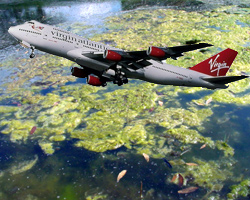
Before meeting with Al Gore over breakfast in 2006, Richard Branson, the swashbuckling founder of Virgin Ltd., an amalgam of over 200 companies sharing the Virgin brand, was long a global warming skeptic. But then the former vice president (and recent recipient of the Nobel Peace Prize for his work to combat climate change) spent two hours at the billionaire entrepreneur’s home laying out his case. “Sadly, I’m now convinced that the world has a serious problem,” he told ABC’s Good Morning America that September with Gore at his side. Joining the former vice president in his environmental crusade, Branson pledged to funnel all profits from his rail and airline holdings over the next 10 years—an estimated $3 billion—into developing a non-ethanol-based, sustainable biofuel to power the world’s cars, trains, and airplanes. Last fall, he and Gore went on to establish the Virgin Earth Challenge, a $25 million award for the development of technology that can suck greenhouse gases from the atmosphere for 10 consecutive years and “contribute materially to the stability of Earth’s climate.”
Since his green awakening, Branson’s flagship airline, Virgin Atlantic, has partnered with Boeing and General Electric to turn its owner’s vision into reality. Last week, Virgin announced plans to test fly a Boeing 747-400 from London to Amsterdam using a blend of about 20 percent biofuel and 80 percent jet fuel. The flight, set for late February, will be the world’s first in-air test of a biofuel by a commercial jet. The composition of the fuel remains a mystery—though some have suggested it could be anything from tree nuts to pond algae—and it remains to be seen whether this is an another Branson PR stunt or a true precursor to an industry-wide change.
According to Virgin spokeswoman Polly Durant, the company “sees this demo flight as the first step on the road toward a more sustainable fuel source for aviation” and hopes that in the future it will allow Virgin’s fleet “to operate more efficiently.”
“Efficiency” is a buzzword in the aviation business, shorthand for cutting costs and increasing profits. There are different ways to approach it, explains Steve Lott, a spokesman for the Montreal-based International Air Transport Association (IATA), an industry trade group. “With fuel flirting with $100 per barrel, it’s in the airline industry’s best interest to reduce fuel consumption as much as possible,” he says. Many airlines now taxi on one engine and use external power sources at the gate. Others have invested in fuel-efficient ground vehicles and have installed winglets (short, vertical wing extensions) to reduce drag and fuel consumption at altitude. Commercial fleets have also begun replacing aging aircraft with newer, “gas-sipping” models.
Nevertheless, Branson’s gamble to replace traditional jet fuel with an organic substitute ventures beyond what most other airlines have been willing to undertake. (Air New Zealand plans to conduct a similar biofuel test later this year.) After all, the industry is a relatively minor greenhouse offender. At the current rate of growth, aviation could produce 3 percent of global CO2 emissions by 2050 and today accounts for 2 percent, according to the UN’s Intergovernmental Panel on Climate Change. IATA claims the industry can become 25 percent more fuel efficient by 2020 simply by tweaking airline operations, improving existing infrastructure, and streamlining air traffic control. The group has set a 50-year goal for the industry to become carbon neutral.
Branson wants to do it sooner than that and has committed himself to halting global warming with all the zeal of a recent convert. According to Lott, Branson also sees an opportunity to do well by doing good. “He wants to start his own fuel company,” Lott says. “There has to be an economic incentive…because there’s a huge R&D investment in this stuff.”
The challenge is to move beyond what scientists call “first generation biofuels,” such as corn, soy, or palm oil. “If you’re going to make fuel from those types of sources, you’re competing with food and freshwater resources, and potentially [causing] some deforestation in order to clear ground to plant those crops,” says Boeing spokesman Terrance Scott. Instead, in its work with Branson and Virgin Atlantic, Boeing has sought to identify “second generation biofuels,” which would step beyond the food-based alternative fuels currently in use, like corn-derived ethanol, toward a more sustainable, long-term substitute for petroleum. The idea is to build a stable of different biofuel sources from around the world—what Boeing calls “regional solutions”—that would work interchangeably and within the existing aviation infrastructure. “It has to perform in the same manner that current jet aviation fuel performs in,” says Scott.
Neither Virgin nor its partners, Boeing and GE, will say what biofuel the airline plans to use. Scott attributed the silence to “customer preference,” indicating that more information could be released in the coming weeks. For now, he would say only that Boeing is investigating more than 20 different “feedstocks” for the production of biofuels, including a flowering plant called jatropha, canola, and the Brazilian babassu nut—all of which yield oils when crushed.
Another potential fuel source, one that Scott alluded to several times, is algae. “The biggest thing you get out of going to biofuels is the ability to reduce CO2 as the plants are growing,” he explained. And along those lines, perhaps more than any other feedstock, algae represents a kind of holy grail to biofuel researchers. It’s a fast-growing, hardy, single-celled organism that takes in carbon dioxide and nitrous oxide and releases oxygen, producing oil, sugar, and protein in the process. It’s biodegradable, can grow in harsh weather, and holds an estimated thirty times more energy per acre than land-based feedstocks. The Energy Department estimated it would require 15,000 acres (an area about the size of Maryland) to grow enough algae to replace all of America’s petroleum needs; it would require half the continental United States to accomplish the same with soy.
“It’s incredible, partly because you get a twofer out of it,” explains Deron Lovaas, director of the Move America Beyond Oil Campaign at the Natural Resources Defense Council, an environmental watchdog group. “You grow the algae thanks, in part, to carbon dioxide captured from smoke stacks, so you reduce pollution in the smoke stack. And you get a bunch of fuel derived from algae, so you end up displacing oil.”
Pond scum as fuel is not a new concept. The federal government first invested in developing the technology in the mid-1970s in response to an oil crisis that sparked a sudden rise in the price of gas for American drivers. But as prices came down, so did the political dividends of pushing alternative fuels, and by 1996, federal budget cuts killed the program. Since then, as oil prices have resumed their upward climb, algae research has transferred to the private sector, where a dozen companies are now racing to transform muck into fuel. Just last year, Boeing demonstrated in a laboratory that, unlike ethanol, algae-derived fuel does not freeze at high altitudes, removing an important obstacle to future airborne testing. Another important difference from ethanol, says Scott, is that “you’re not taking food off the table if you’re talking about pond scum.”
Would it be unrealistic to expect that Virgin Atlantic might test an algae-derived fuel next month? “No,” Lovaas said. “That would not shock me. That would be amazing! It would be a breakthrough development if they were able to do this…a big step forward, even a leap forward, and a tribute to Lord Branson.” But even if it turns out not to be algae, “what Virgin and Boeing are doing deserves praise,” he added. “This is exactly what the whole industry should be looking at.”
















